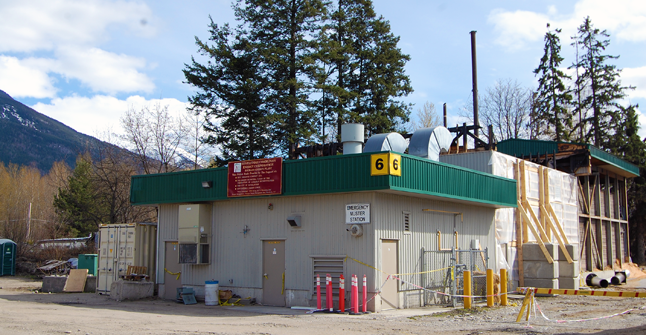
By Laura Stovel
Shut down after a fire in February, Revelstoke District Energy should be fully back in business in about three to four months from now, says Geoff Battersby, president of the municipally-owned Revelstoke Community Energy Corporation (RCEC) that runs the plant.
The fire started early in the morning on February 23rd in the roof of building, above the sprinkler system that was suspended from the ceiling. The sprinkler system didn’t kick in immediately because the fire was above the sprinklers but “as the burning debris fell down into the plant, the sprinklers put it out right away so there was virtually no fire damage to the equipment and the plant itself,” Battersby said.
The main damage was to the roof and water damage to the equipment, he said. There was also fire damage to the backup propane boiler.
Bringing customers back on line
“Initially our main thrust was to get our customers back on line. We were able to locate a boiler in Vancouver that had just been rebuilt. It was not quite as big as we really needed but it had sufficient capacity.” It took about ten days to find and install the backup boiler so most customers were connected with the backup system fairly quickly.
Many of RCEC’s customers had their own back-up systems or had had boilers in the past that were still available for use. “We just did the plumbing and wiring to hook them up,” Battersby said. The exception was the Catholic Church which did not have its own heating system, though the hall had electric back-up. “I think they only had one cold Sunday,” he said.
Six weeks after fire only Revelstoke Secondary School, Begbie View Elementary School and Downie Sawmill are not hooked up to the RCEC backup system. The two schools have their own propane backup systems – and in fact were able to provide RCEC with back-heat immediately after the fire to prevent the equipment from freezing. “We had to do some replumbing to do that,” Battersby said. Downie Mill also has its own backup system.
“We should be able to get Begbie View Elementary back on the system soon – when the electronic controls in the plant are restored. We will not be able to provide Downie’s dry kilns with energy until the plant is fully operational,” Battersby said.
Slow process of rebuilding
The cause of the fire is still unknown, despite post-fire inspections by the insurance adjuster, the BC Safety Authority and by Welland, a company that sells biomass boilers and has expertise in inspecting biomass equipment after fires. Even after all these efforts, “It’s a real mystery why a fire would start way up there” in the roof, Battersby said. The Welland inspectors “were amazed that there was no fire damage to the majority of the plant. It was all water damage.”
Although the process of getting the plant back in operation has been “painfully slow,” all the contractors involved have responded as quickly as they could, Battersby said. The collapsed roof had to be cleaned up and the building secured before the Welland inspectors could visit. The roof has to be rebuilt before the equipment can be tested.
The truss manufacturers were here last week and have been working concurrently with the engineers. The trusses will begin to be manufactured late this week and should be complete within two weeks, RCEC manager Larry Marchand said.
Once the roof is on and everything dries up inside, the detailed clean-up begins – another two-week process. “This is not a typical project,” Marchand said. “We’re working backwards, starting with the roof to have a dry space to work in.” The cleanup is “finicky, labour-intensive” work. “Every cable needs to be cleaned and tested.”
After the site is cleaned up the electricity can be turned back on and the detailed electrical work begins.
RCEC is not taking a huge financial hit because of this fire because it is well insured. “The insurance covers our loss of revenues. It covers any penalties that we might have when we’re down. And it covers our additional costs – because when we’re heating the hot water purely with propane, not with free wood and biomass, that’s going to cost us a lot more to get heat to our customers,” Battersby said.
One lesson that has come out of this experience is the importance of locating a back-up boiler away from the biomass plant site. Battersby said that “ironically, we’ve recently been talking about” the dangers of having a backup boiler “sitting in the same room as the main boiler.” RCEC hesitated to invest in this because of the costs of moving the existing boiler to another location. “Now we’re seriously looking at having a back-up boiler in another location so if this should ever happen again we’re still in business.”



